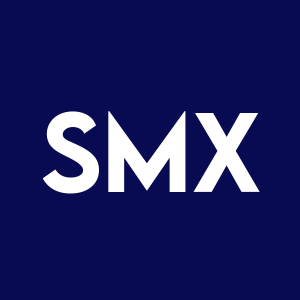SMX Brings Identity to American Plastics as FDA-Compliant Molecular Marking Turns rPET Into a Certified Commodity
Rhea-AI Summary
SMX (NASDAQ:SMX) announced a U.S. partnership with Miami distributor Tradepro on November 14, 2025 to embed FDA‑compliant molecular markers into recycled PET (rPET), meeting 21 CFR food‑contact substance standards.
The markers persist through remelting and remanufacturing, enabling verifiable material identity, traceability, and batch-level logging. SMX has prior deployments across Southeast Asia and demonstrations in Europe on difficult polymers. The company links marked rPET to digital instruments such as its Plastic Cycle Token to make recyclate tradeable and investable.
The release cites market context: a global plastics market above $800 billion and a recycling segment valued near $50 billion, stressing verification bottlenecks that the technology aims to remove.
Positive
- FDA‑compliant markers meeting 21 CFR food‑contact standards
- First major U.S. partnership with Tradepro announced on November 14, 2025
- Prior deployments across Southeast Asia and demonstrations in Europe
- Enables rPET traceability and linkage to the Plastic Cycle Token for tradability
Negative
- Recycling market remains underdeveloped (~$50B) due to verification bottlenecks
- Material verification requires an appropriate reader to confirm identity
News Market Reaction
On the day this news was published, SMX declined 17.26%, reflecting a significant negative market reaction. Argus tracked a trough of -14.4% from its starting point during tracking. Our momentum scanner triggered 15 alerts that day, indicating notable trading interest and price volatility. This price movement removed approximately $502K from the company's valuation, bringing the market cap to $2M at that time.
Data tracked by StockTitan Argus on the day of publication.
NEW YORK, NY / ACCESS Newswire / November 14, 2025 / For decades, plastics have moved through the world without an identity. They were manufactured, used, discarded, shredded, melted, and remade, but the material never carried a history. Once waste entered the recycling stream, its past vanished. And without origin, plastics could not carry value.
SMX (NASDAQ:SMX) is changing that paradigm by bringing identity to the material itself. In a new U.S. partnership with a respected Miami-based plastics distributor, Tradepro, the company is embedding its FDA-compliant molecular markers directly into recycled PET resin. The marker adheres to 21 CFR standards for Food Contact Substances, making it viable for one of the most highly regulated categories in the entire materials landscape.
In simple terms, SMX is giving rPET something it has never had before: a persistent, verifiable identity that survives every melt and remanufacturing cycle. Food-grade packaging made from recycled content can now prove that it is legitimate, compliant, and authentic, not because a supplier claims so, but because the material itself carries the proof.
This shifts recycled plastic from a commodity defined by risk to a material defined by credibility.
The U.S. Becomes a Launchpad for Identity-Driven Recycling
The partnership marks SMX's first major foothold in the American plastics ecosystem, but it is part of a larger global plan. Across Southeast Asia, SMX has already embedded markers during extrusion, ensuring traceability at the moment plastic takes shape. In Europe, the company demonstrated that even the most challenging polymers, including flame-retardant and carbon-black plastics, can be identified through molecular reading.
Together, these programs map out a universal identity layer for recycled plastics. Geography no longer dictates credibility. Application no longer dictates limitations. If a material carries an SMX identity, its origin and lifecycle can be confirmed anywhere, at any time, by anyone with the appropriate reader.
This is the first step toward a world where recycled plastics are treated as certified commodities rather than discounted substitutes.
Identity Converts Waste Into a Financial Product
For recycled plastics, the missing piece has never been supply. It has been trust. Governments are imposing quotas. Global brands are pledging recycled content. But without a mechanism to verify the material itself, these targets have been impossible to meet at scale.
SMX closes that trust gap. Once a molecular marker is added, every batch of recycled resin becomes a traceable asset. Its movements can be logged. Its integrity can be affirmed. Its recycled content can be priced accurately.
And when tied to digital instruments such as SMX's Plastic Cycle Token, rPET transforms from a downstream cost into an upstream financial product. Recycled content becomes measurable. Measurable content becomes tradeable. And, tradeable content becomes investable.
This redefines the economics of recycling. Proof no longer lives in paperwork. Proof becomes intrinsic to the material itself, creating a pathway for rPET to compete directly with virgin resin in the highest-value markets.
Food-Grade rPET Becomes the Turning Point
The ability to operate in compliance with FDA regulations is a watershed moment for the entire industry. Food-grade packaging has historically been the most difficult category for recycled content to enter. It requires consistent quality, stable chemistry, and absolute confidence that the material is safe.
By passing FDA-related compliance thresholds through molecular marking, SMX shows that recycled plastics do not need to live in low-margin, low-performance tiers. They can move into premium applications where oversight is strict, margins are higher, and credibility is everything.
In this context, rPET is no longer a second-class material. It becomes a certified input with a documented history and a verifiable identity.
The opportunity is enormous. The global plastics market sits above
So, no, this isn't a recycling story. It is an identity story. And it signals the beginning of a materials economy where every product can carry its own truth.
About SMX
As global businesses face new and complex challenges relating to carbon neutrality and meeting new governmental and regional regulations and standards, SMX is able to offer players along the value chain access to its marking, tracking, measuring and digital platform technology to transition more successfully to a low-carbon economy.
Forward-Looking Statements
This information contains forward looking statements within the meaning of the Private Securities Litigation Reform Act of 1995, Section 27A of the Securities Act of 1933, and Section 21E of the Securities Exchange Act of 1934. These statements are based on current expectations, estimates, forecasts, and assumptions regarding future events involving SMX (NASDAQ:SMX), its technologies, its partnership activities, and its development of molecular marking systems for recycled PET and other materials. Forward looking statements are not historical facts. They involve risks, uncertainties, and factors that may cause actual results to differ materially from those expressed or implied.
Forward looking statements in this editorial include, but are not limited to, expectations regarding the integration of SMX's molecular markers into U.S. recycling markets; the potential for FDA-compliant markers to enable recycled PET to enter food-grade and other regulated applications; the scalability of SMX solutions across diverse global supply chains; anticipated adoption of identity-based verification systems by manufacturers, recyclers, regulators, or brand owners; the potential economic impact of turning recycled plastics into tradeable or monetizable assets; the expected performance of SMX's Plastic Cycle Token or other digital verification instruments; and the belief that molecular-level authentication may influence pricing, compliance, sustainability reporting, or financial strategies used within the plastics sector.
These forward looking statements are also subject to assumptions regarding regulatory developments; market demand for authenticated recycled content; the pace of corporate adoption of traceability technology; global economic conditions; supply chain constraints; evolving environmental policies; and general industry behavior relating to sustainability commitments and recycling mandates. Risks include, but are not limited to, changes in FDA or international regulatory standards; technological challenges in large-scale deployment of molecular markers; competitive innovations from other companies; operational disruptions in recycling or plastics manufacturing; fluctuations in pricing for virgin or recycled plastics; and the broader economic conditions that influence capital investment and industrial activity.
Detailed risk factors are described in SMX's filings with the Securities and Exchange Commission, including the Annual Report on Form 10-K and subsequent Quarterly Reports on Form 10-Q. Readers are cautioned not to place undue reliance on forward looking statements. These statements speak only as of the date of publication. SMX undertakes no obligation to update or revise forward looking statements to reflect subsequent events, changes in circumstances, or new information, except as required by applicable law.
EMAIL: info@securitymattersltd.com
SOURCE: SMX (Security Matters) Public Limited
View the original press release on ACCESS Newswire






